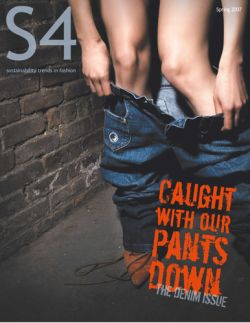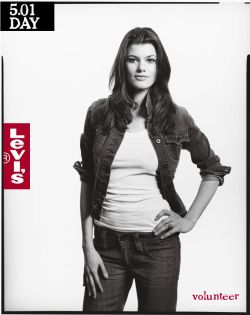 “Who are the big, fat, tall people that buy the jeans we make?”
“Who are the big, fat, tall people that buy the jeans we make?”
That’s the question that Jasmine, 16, innocently asks in Micha Peled’s documentary China Blue, a clandestine view of three girls’ lives in a Chinese sweatshop. I felt pretty embarrassed watching Jasmine cut the threads off our blue jeans during her 20-hour workday. It’s the same Catholic schoolgirl guilt you get when the burly, bearded dude walks in on you because the gas station’s bathroom lock is broken, or when your parents or roommate come home when they just weren’t supposed to. Once again, we’ve been caught with our pants down.
But this time, we’re participating in one of the largest human-rights abuses of all time. Which makes denim a damn good product around which to strike up a conversation about social issues.
Sorry, trusty Blue Jeans. You know I love you. You’ve been there for me through all occasions — my birthdays, my late-night outings, my first kiss, my first break-up … When I don’t know what to wear, you’re there for me … but now, it’s time to hang you out to dry … if only to make a point.
And a very important point at that. With all the green marketing out there, social issues are the next frontier that needs to be jointly tackled by the garmento gods. To answer Jasmine’s question: We are the big, fat, tall people who buy the jeans you make. And damn it — it’s about time we do something about it.
Here are a few ways to start shedding your shame:
- Check out the alternatives. Lots of denim labels are pledging eco-conscious initiatives, including Replay, Loomstate, Del Forte, Howies, Mission Playground, Sling and Stones, and a host of others. Most of the denim brands are aimed at the premium market, but brands like Levi’s and Rica Lewis offer some cost-sensitive items for the more budget-conscious. Read the latest issue of my newsletter, S4 on Denim. You’ll see how companies are beginning to think about their ecological and social footprint; what individuals, NGOs, and companies are doing to push the envelope; and why I consider 2007 the “Year of the Eco-conscious Blue Jean.”
- Slip into something more comfortable. On May 1, Levi’s is launching 501 Day to encourage community volunteering. The tradition dates back to the founding of the company, but this is the first time they’re advertising it openly and inviting the public to participate. Three organized events will happen in New York City, Los Angeles, and San Francisco, but I encourage anyone in any community to go out and volunteer — any day of the week. I’ll be in L.A. to clean up the beach with Levi’s and Heal the Bay, so put on your swim trunks and come out and join us. You can register on the website (preferable) or near their in-store displays. (In this poster, part of a series, I’m sporting my Levi’s Eco; in some locations, the posters will be life-size — big enough to frighten kids and adults alike into volunteering.)
- Shop smarter. Come out to the REPLAY Store in NYC (109 Prince Street at Greene) on May 3, 4, and 5 from 4-6 p.m. I’ll be there with the rest of the REPLAY team in case you have any burning questions about sustainable fashion or other-related eco topics.
- Wear ’em in. In the market for some jeans, but don’t want to go new? Check out places like Buffalo Exchange, Sally’s (The Salvation Army) and vintage shops where you can get pre-worn varieties for part of the price.
- Wear ’em out. Are your old blues a thread too bare? Take them to Denim Therapy or back to Del Forte for some Project Rejeaneration.



